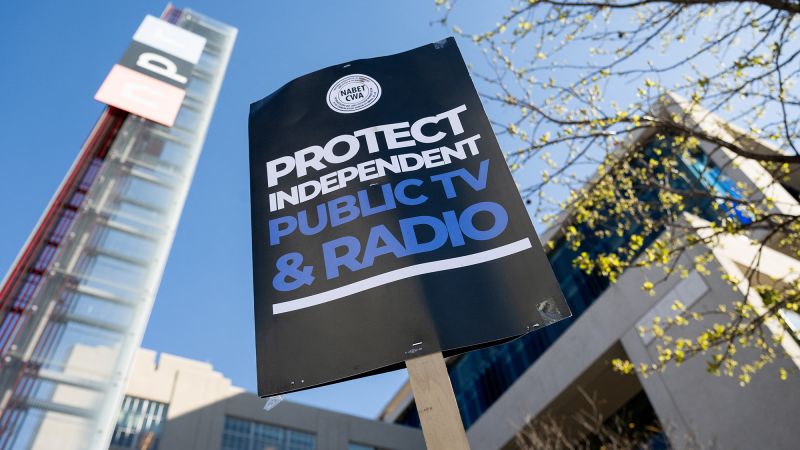CNN
—
America’s two big public broadcasters, PBS and NPR, have 45 days to salvage their federal funding — starting now.
On Tuesday, the Trump administration sent Congress a long-awaited request for lawmakers to cancel more than $1 billion in federal funds earmarked for the Corporation for Public Broadcasting, the entity that disburses taxpayer funds to local NPR and PBS stations across the country.
The request, known as a “rescission package,” starts a 45-day clock for Congress to either approve or ignore the proposal. Rescinding the funds only requires a simple majority, which means in this case that no Democratic votes are needed.
However, Republicans only have slim majorities in both the House and Senate, and public media executives are cautiously hopeful that they can convince some Republican moderates to ignore the White House’s proposal, thereby killing it.
Get THE Reliable Sources newsletter
White House budget director Russ Vought said on Fox News Tuesday afternoon that the House will be “putting this on the floor next week.”
Vought also warned, “If it doesn’t pass, we have to then release the funds and it has to be spent.”
The 45-day period will end on July 18. Until then, PBS and NPR officials will be lobbying lawmakers and counting votes. NPR said its lobbying efforts will start on the House side, “where we expect the memo to be first taken up,” CEO Katherine Maher said in a statement.
“During this fight we will demonstrate our value to Congress, as we have over the last 50 years, in providing educational, enriching programs and critical services to all Americans every day for free,” PBS CEO Paula Kerger said in a separate statement.
The funds being targeted now were allocated by the Republican-controlled Congress in a bill that Trump signed into law earlier this spring but haven’t been spent yet because the Corporation for Public Broadcasting is budgeted two years in advance.
Trump, tapping into long-held conservative beliefs that NPR and PBS are biased in favor of liberals, is now trying to strip away the future funding and score a political win.
Kerger said it would be a loss for the public at large. “The proposed rescissions would have a devastating impact on PBS member stations and the essential role they play in communities,” she said, “particularly smaller and rural stations that rely on federal funding for a larger portion of their budgets. Without PBS member stations, Americans will lose unique local programming and emergency services in times of crisis.”
The Trump White House has targeted public media on multiple fronts in recent weeks.
The president signed an executive order in early May directing the Corporation for Public Broadcasting to stop funding PBS and NPR. He also tried to fire three of the corporation’s board members.
The corporation has essentially ignored him, however, because it is a private nonprofit entity set up by Congress and historically insulated from presidential interference. The entity has filed suit with the hopes that a federal court will affirm its independence.
Both NPR and PBS have also filed separate lawsuits accusing the administration of violating the First Amendment.
All three cases have been assigned to Judge Randolph D. Moss.
Furthermore, the Federal Communications Commission is conducting a probe into NPR and PBS member stations, citing concerns that public media underwriting messages may be violating federal law.
But of all the attempts to target public media this year, Tuesday’s proposal stands out.
“This rescission proposal is the most serious threat ever faced by public broadcasting,” Maher wrote in her statement. “We urge Congress to act in the interest of their constituents and save public broadcasting.”

